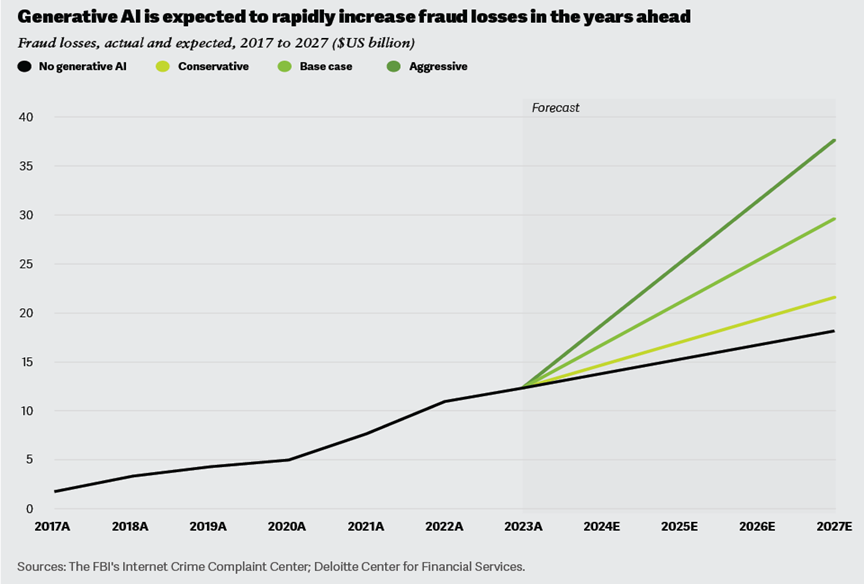Artificial Intelligence is the innovation of technology, which like every other invention has captured its potential in both constructive and destructive aspects. Based on Machine learning models, AI models have an unprecedented capability to analyse and manipulate given information based on data backed inferences.
AI-led phishing reports in the first quarter of 2025 skyrocketed by 466% than last year. While the total global scam costs associated with AI-driven frauds amounted to a massive 1 trillion dollars over the past year. These AI scam statistics give us a perspective on how destructive and lethal these various types of AI scam can be across individuals and organizations, both financially and emotionally.
In this blog, we will discuss the typical ways in which fraudsters try to scam you, how you can identify possible threats, and what to do if scammed. Here is a look at the typical ways you might encounter scammers.
Major AI-driven Scam Ways used by Fraudsters
Artificial Intelligence models can be dynamic and can potentially manipulate all sorts of data to influence you in the trap of fear and urgency. Whether it is text, video, photos, or even audio, AI can invariably manipulate the content to make it human-like. The core emotions that fraudsters play with are potential loss, account suspections and data leaks.
Voice Cloning
Audio is the most typical way that fraudsters use to ignite fear. These AI generated voice scams can be through phone calls, voice-note messages, or even video calls. In India, over 83% of people who are approached by AI voice scammers lose money, with up to half of them losing amounts equivalent to ₹50000.
The AI generated voices are indistinguishable from real ones, created with modern software tools achieving high accuracy. People are only able to distinguish AI from human voices 3 out of 5 times. Which might not look huge, but practically can be very dangerous taking into account the delegation tendency of AI.

Deepfakes
With emerging new deepfake software tools, the attempts of fraud have increased 3000% since 2023. You might wonder that deepfakes can be much easily identified over voices, but the reality tells something else. The percentage of accurate identification of high-quality deepfake videos is strikingly low at only 24.5%.
This explains why people across all ages, qualifications, and backgrounds are prone to fall in the trap of frauds. The typical ways scammers use deepfakes are impersonation, live real-time frauds, urgent emergencies, and building deepfake models of public figures. Impersonating government individuals, family members, or high ranking authorities ignites fear or urgency to give money or data among the targeted.
Romance Scams
Romance scams are a dangerous and rising way by which scammers strategically ask for money. Romance scams alone have amounted to a billion dollars in losses in the past year and the number is rising exponentially. These AI voice cloning scams typically ask for money under shell companies leaving no trace for investigations.
This strategy starts by scammers creating fake profiles on dating platforms and nurturing a relationship long enough to create trust. This trust is then manipulated by an urgent call for money for various reasons. These scams are not only financially exploiting but also emotionally devastating.
Social Media Scams
Artificial Intelligence is meant for automation. Guess what? 82 % of all phishing messages across social platforms are now AI-generated. Everyone is virtually on social media. Many people share too much information on such platforms which can be subject to manipulation by scammers.
Social Media platforms are one of the main streams for frauds. AI generated bots across social media are trained to run conversations, DMs, posts, and replies to gain personal information which can be used to target individuals to ask for money several times.

Investment Scams
Investments open a lot of ways for scammers to target. From transactions and data to shaping fake markets tends to ignite investments in a particular direction like a volatile cryptocurrency.
As the potential of AI to create and scale mass opinion with personalised targeting, is insane, the proximity of fraud also increases. The traditional detection and prevention safety measures fail miserably with dynamic approaches of AI and its ability to read patterns and break into systems.
Impersonation Scams: OTP Frauds
Scammers impersonate trusted sources and authorities to gain access to accounts by shared OTPs. They typically impersonate bank officials, government authorities and other tech support helplines to ask for OTPs threatening account suspensions or other fake scenarios.
They use voice cloning via AI by analyzing pre-existing voices of people and creating similar voice notes to gain control of the escalating situation and ignite fear and urgency.
How do AI Scams Work?
You might wonder: How do AI scams work? Or how can AI impersonate people? And the answer is simple. The software space is full of AI voice generator tools which work by training AI machine learning models to analyse a piece of content through complex code and then manipulate it by adding references as instructed by the prompt.
With time, the quality has improved vastly of such models as they learn from different instructions adding more diversification to the database. This is the basic technology behind voice cloning and impersonation.
Then the question arises: Is AI voice cloning legal? The legal framework and stance of India and the world is against unauthorised use of voices of individuals and public figures as it violates privacy and consent, while possibly leading to scams.
Potential Dangers from AI Deceit
AI driven scams have various complications to both individuals and organizations. As mentioned, the impacts can be both financially and emotionally devastating causing severe issues to mental well being.
As individuals, leaked sensitive information can cause money losses, and lead to lack of trust on online interactions and institutions. For businesses, it can lead to account takeovers, fraud payments, and identity thrift further causing reputation damage and even loss of customer trust.
How to Stay Safe from AI Scams?
We have discussed the causes, methods and possible implications of AI scams. The only way out is understanding that prevention is better than cure. Although, once scammed, there is a security system which can get your money and information back, but staying skeptical is very important.

As Individuals
Keeping yourself safe from AI scams as individuals involves:
- Verifying identities of Sources
- Keep an eye at audiovisual deflections
- Restrain from sending money
- Communicating with Caution
- Do not share sensitive information
- Don’t click on unknown links and attachments
As Businesses and Institutions
Business and institutions deal with sensitive data and high cash flow, which is at risk with the growing number of ways by which AI is contributing to causing frauds. Data privacy and security needs secure devices and software, restraining from sharing sensitive information in communicating with clients or elsewhere, adding multi level authentication, and reviewing disclosures.
Marketing is a crucial part of businesses and AI-driven models fake themselves as marketing agencies to capture account control and sensitive information leading to financial losses and other complications we discussed earlier.
It can be hard to find marketing agencies that excel at what they do and provide a secure ecosystem for data flow. At Trumpet Media, we provide a safe ecosystem for data and money flow backed by a team of marketing maestros having produced results beyond norms for hundreds of brands across various industries.
What to do if scammed?
It can be devastating to be scammed but you don’t have to worry as long as you are transparent with security systems and ask for help by reporting fraud and calling the authorities to get legal advice. Notifying financial institutions and informing the credit bureaus can solve the issue both rapidly and efficiently.



